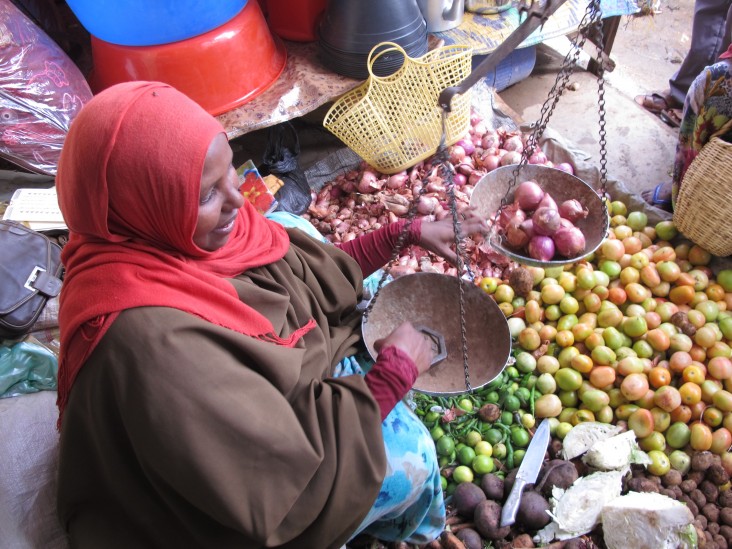Speeches Shim

Agriculture and Food Security
We provide emergency food and nutrition assistance through market-based interventions that reduce acute food insecurity among the most vulnerable populations. We help build resilient households and communities by supporting disaster risk reduction activities designed to protect and restore livelihood assets. We assist humanitarian partners working in health, nutrition, water, sanitation and hygiene, as well as in agriculture, food security, protection, economic recovery and market systems.
Democracy, Human Rights, and Governance
USAID promotes the development of effective and accountable governance across Somalia. We back efforts to enhance government outreach, increase citizen participation in political and electoral processes, improve the functional capacity of key government institutions, and expand women’s empowerment and leadership.
Transparent, accountable government and civil society are vital to cementing Somalia’s long-term stability. USAID and the international community are supporting the implementation of the country's transitional roadmap, including the constitution-making process and preparations for national elections.
- USAID helps to establish local governance institutions and build their capacity to reach out to constituents and civil society.
- USAID supports civil society’s active engagement in peace, reconciliation and reconstruction, with particular emphasis on under-represented groups.
Economic Growth and Trade
We work with local authorities and private businesses to advance stability through economic growth. Our programs improve the investment climate and create jobs in sectors including livestock, farming, agri-business, fisheries and renewable energy. We emphasize building the capacity of both internal investors and of the Somali diaspora eager to invest in business opportunities.
Assistance to improve markets and trade not only benefits the local economy, but also improves stability in the region. Unemployment or underemployment not only depletes families’ assets, but also sows discontent, making youth - especially young men - more vulnerable to indoctrination of violent extremist organizations.
Creating economic opportunities can help derail these efforts.
- Improve the business environment through access to finance and support to policy and regulation
- Promote enterprise development through business development services
- Increase participation of women and youth in the economy as employers, employees and entrepreneurs
- Improve production, employment, and incomes in select sectors
Education
USAID supports the next generation of leaders by expanding equitable access to quality secondary education, focusing on increasing girls’ enrollment and reaching pastoralist and other marginalized children. Our programs construct new school facilities, train hundreds of teachers, provide textbooks and other teaching and learning materials, and help out-of-school youth gain access to economic opportunities through vocational training.
Somalia’s basic social services have been decimated due to civil unrest and years of underinvestment. USAID assists regional authorities and local communities by providing education services that mitigate conflict and improve the capacity of governance institutions to deliver quality and equitable services. USAID expands access to education, and contributes to a more stable future. We:
- Increase enrollment and retention of school age children from target groups.
- Enhance capacity of government to develop and implement a non-formal education policy and strategy.
- Strengthen capacity of community groups to support education programs.
- Increase support for education among parents, elders, and religious leaders.
- Improve reading outcomes.
- Improve professional development and performance of teachers
Working in Crises and Conflict
Through participatory processes that promote good governance and community cohesion, we improve stability, improve citizen confidence in government and reduce the appeal of violent extremism. We empower women and girls by encouraging them to actively participate in selecting stability projects to be implemented in their communities, and through targeted interventions such as women’s basketball and various cultural activities. We support projects that promote social reconciliation, trauma healing, peace building and community resilience to violence.
USAID’s stabilization activities seek to increase confidence in all levels of government through targeted, strategic interventions that improve service delivery and government responsiveness. With USAID, Somali government institutions, the private sector, and civil society collaborate to design, evaluate, and deliver projects with a quick and lasting impact on the lives of Somali citizens in critical risk areas.
Community stakeholders collaboratively identify and prioritize the projects that will provide the greatest benefit to their communities. USAID has supported over 900 projects in 17 of Somalia's 18 regions, focusing on high-risk communities in hard-to-reach areas, particularly those liberated from al-Shabaab control. Projects include;
- Roads built across Somalia, benefiting an estimated 5 million people
- Government buildings newly constructed to improve government’s capacity to deliver vital services in the regions
- Clinics, markets, bridges and irrigation canals rehabilitated, improving the lives of citizens and increasing confidence in local goverrnment service delivery
- Garbage trucks delivered, boosting the governments ability to address solid waste management and sanitation, building trust between citizens and the local government
- Trained technical staff that is embedded in Ministries across Somalia to improve government capacity
- Solar powered streetlights installed, increasing urban safety and security
- Employment opportunities created to improve livelihoods, reducing the risk of youth joining extremist groups
- Government-community dialogue events organized to build trust in the government and sustain activity impact
- Reconciliation and social cohesion forums organized across Somalia, reducing the risk of conflict
Hundreds of youth also received vocational training in entrepreneurship, mechanics, electrical repair and installation, to name a few courses. Many have found employment with their new skills and have even opened up businesses. With money in their pocket, and hope for a better future, violent extremism is a less attractive option.


Comment
Make a general inquiry or suggest an improvement.